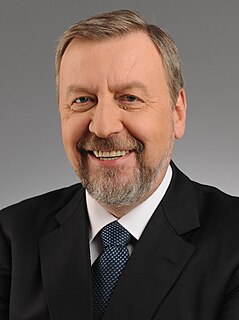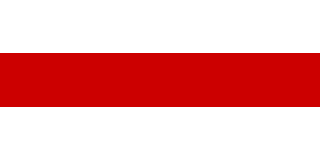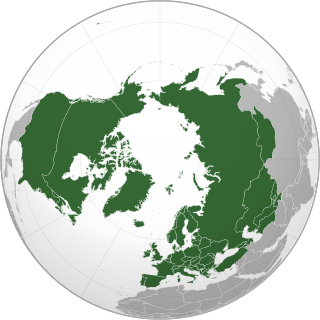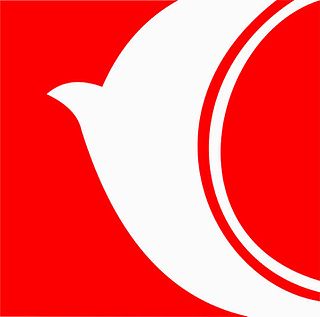
The politics of Belarus takes place in a framework of a presidential republic with a bicameral parliament. The President of Belarus is the head of state. Executive power is exercised by the government, at its top sits a prime minister, appointed by the President. Legislative power is de jure vested in the bicameral parliament, the National Assembly, however the president may enact decrees that are executed the same way as laws, for undisputed time. Belarus's declaration of independence on 27 July 1990, did not stem from long-held political aspirations but from reactions to domestic and foreign events. Ukraine's declaration of independence, in particular, led the leaders of then Belarusian SSR to realize that the Soviet Union was on the brink of dissolving, which it did.

The BPF Party, is a political party in Belarus. It was de-facto established after the split of the social movement Belarusian Popular Front or BPF (Belarusian: Беларускі Народны Фронт "Адраджэньне", translit. Biełaruski Narodny Front "Adradžeńnie" or БНФ in 1999. The Belarusian Popular Front was founded during the Perestroika era by members of the Belarusian intelligentsia, including Vasil Bykaŭ. Its first and most charismatic leader was Zianon Pazniak.

Belarus elects on national level a head of state - the president - and a legislature. The president is elected for a five-year term by the people. The National Assembly has two chambers. The House of Representatives has 110 members elected in single-seat constituencies elected for a four-year term. The Council of the Republic has 64 members, 56 members indirectly elected and eight members appointed by the president.
The People's Coalition 5 Plus was a political alliance in Belarus, that opposed the regime of president Alexander Lukashenko. At the legislative elections, 13–17 October 2004, the alliance won no seats. The coalition is formed by the following parties:
The Belarusian Social Democratic Party (Assembly) is a social democratic political party in Belarus, that opposes the government of president Alexander Lukashenko.

The Conservative Christian Party of the Belarusian People's Front is a political party in Belarus, that opposes the government of president Alexander Lukashenko. It was de facto formed after the split of the Belarusian People's Front in 1999.

The Constitution of the Republic of Belarus is the ultimate law of Belarus. Adopted in 1994, three years after the country declared its independence from the Soviet Union, this formal document establishes the framework of the Belarusian state and government and enumerates the rights and freedoms of its citizens. The Constitution was drafted by the Supreme Soviet of Belarus, the former legislative body of the country, and was improved upon by citizens and legal experts. The contents of the Constitution include the preamble, nine sections, and 146 articles.

The Belarusian presidential election of 2006 was held on 19 March. The result was a victory for incumbent President Alexander Lukashenko, who received 84.4% of the vote. However, Western observers deemed the elections rigged. The Organization for Security and Co-operation in Europe (OSCE) declared that the election "failed to meet OSCE commitments for democratic elections". In contrast, election observers from the Commonwealth of Independent States (CIS) described the vote as open and transparent.

A seven-question referendum was held in Belarus on 24 November 1996. Four questions were put forward by President Alexander Lukashenko on changing the date of the country's independence day, amending the constitution, changing laws on the sale of land and the abolition of the death penalty. The Supreme Council put forward three questions on constitutional amendments by the Communist and Agrarian factions, local elections and the national finances.

Euro-Belarusian relations refers to relations between the Republic of Belarus and the European Union (EU). Mutual relations were initially established after the European Economic Community recognised Belarusian independence in 1991.

The Belarusian parliamentary election, 2008 was held in Belarus on 28 September 2008. The 110 seats in the House of Representatives were at stake.

Human rights in Belarus have been described as "poor". The Belarusian government is criticized for human rights violations and its persecution of non-governmental organisations, independent journalists, national minorities, and opposition politicians. In a testimony to the United States Senate Committee on Foreign Relations, former United States Secretary of State Condoleezza Rice labeled Belarus as one of the world's six "outposts of tyranny". In response, the Belarusian government called the assessment "quite far from reality". As at 2017, the Viasna Human Rights Centre lists two political prisoners, down from 11 in 2016 currently detained in Belarus.

A presidential election was held in Belarus on 19 December 2010. The election was originally planned for the beginning of 2011. However, the final date was set during an extraordinary session of the National Assembly of Belarus on September 14, 2010.

Andréi Olégovich Sánnikov is a Belarusian politician and activist. In the early 1990s, he headed the Belarusian delegation on Nuclear and Conventional Weapons Armament Negotiations, also serving as the Belarusian diplomat to Switzerland. From 1995 to 1996, he served as Deputy Foreign Minister of Belarus, resigning as a form of political protest. He co-founded the civil action Charter 97, and was awarded the Bruno Kreisky Prize in 2005.

The Belarusian democracy movement is an opposition movement in Belarus which seeks to challenge the government of President Alexander Lukashenko.

Parliamentary elections were held in Belarus on 23 September 2012. At stake were the 110 seats in the House of Representatives, the lower house of the National Assembly of Belarus.

Parliamentary elections were held in Belarus on 11 September 2016.

Vsevolod Yanchevski is a Belarusian statesman and politician, assistant to the authoritarian president Alexander Lukashenko and member of his administration responsible for state ideology. He has been included in EU sanctions lists between 2011 and 2016.
























